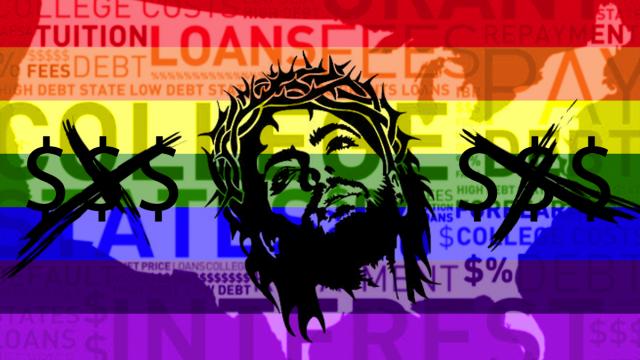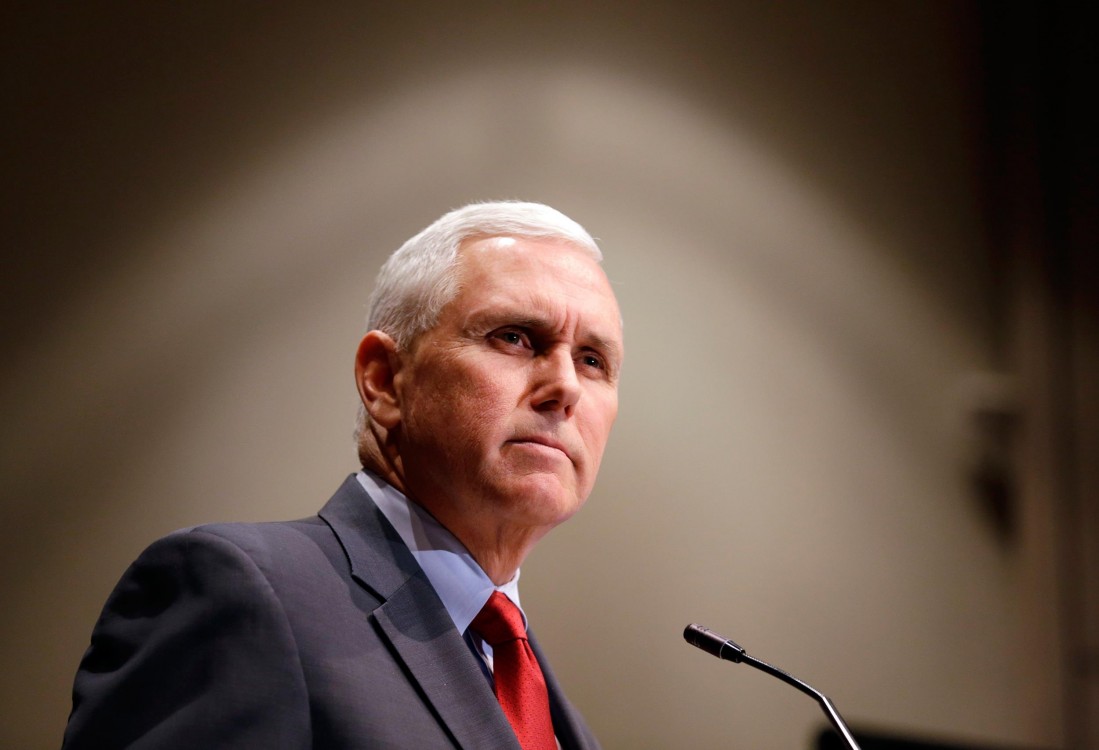
There’s now an easy solution for all student debtors who are locked into a lifetime of debt with ever-increasing interest: Become a Christian and move to Indiana. Hallelujah!
Indiana’s new “Religious Freedom Restoration Act” makes it the 20th state to pass legislation that could potentially allow businesses to discriminate against LGBT customers while claiming it is their right to do so for “religious freedom” reasons. Naturally, this has sparked a national backlash and boycott effort.
In the midst of mounting backlash, Indiana governor Mike Pence recently failed to answer six yes-or-no questions as to whether or not the law he signed would discriminate against LGBT citizens. To his credit, Pence has stated that he would support legislation to be introduced soon which would clarify that the RFRA protections wouldn’t be used to discriminate against the LGBT community.
But this law actually has a silver lining for student debtors in desperate circumstances – the law’s vague wording leaves a lot of wiggle room for anyone willing to challenge their student debt in court based on “religious freedom” reasons. Here’s the meat and potatoes of Indiana’s maligned new RFRA law:
“A governmental entity may substantially burden a person's exercise of religion only if the governmental entity demonstrates that application of the burden to the person: (1) is in furtherance of a compelling governmental interest; and (2) is the least restrictive means of furthering that compelling governmental interest.”
The Indiana law is simply the latest version of a federal law signed in 1997 by President Bill Clinton, which states:
“Government may substantially burden a person’s exercise of religion only if it demonstrates that application of the burden to the person—
(1) is in furtherance of a compelling governmental interest; and
(2) is the least restrictive means of furthering that compelling governmental interest.”
So how does this apply to student debt? In the Bible, there are multiple verses that condemn usury – the practice of lending money at high interest rates. In the Book of Exodus, shortly after God issued the Ten Commandments to Moses and the Israelites, God strictly commanded his people not to commit usury.
“If you lend money to any of my people with you who is poor, you shall not be like a moneylender to him, and you shall not exact interest from him.” (Exodus chapter 22, verse 25.)
Later in the Old Testament, the prophet Ezekiel reiterates God’s distaste for usurers:
“Lends at interest, and takes profit; shall he then live? He shall not live. He has done all these abominations; he shall surely die; his blood shall be upon himself.” (Ezekiel chapter 18, verse 13, ESV)
“In you they take bribes to shed blood; you take interest and profit and make gain of your neighbors by extortion; but me you have forgotten, declares the Lord God.” (Ezekiel chapter 22, verse 12, ESV)
Currently, the interest rates on federal student loans are at a whopping 4.66 percent, which will net the federal government roughly $127 billion in profit over the next 10 years. Compare that 4.66 percent rate given to people trying to further their education to the preferential 0.75 interest rate the big banks get for borrowing billions of dollars to continue financial schemes aimed at bilking people out of their homes and life savings.
Assuming the average student takes out $30,000 in debt to pay for an undergraduate degree and has a 10-year payment agreement with a 4.66 percent interest rate, that will cost the student debtor $313.23 per month, according to the bankrate.com student loan calculator. When combining that expense with rent, a car loan, and other monthly expenses like groceries, gas, electricity, heat, and internet, it’s a miracle if the student debtor is able to make those payments without defaulting.
As I wrote in my previous student debt article, one in seven student debtors will default within the first three years of payments. And unlike other debts, student debt can’t be discharged through bankruptcy, and a degree can’t simply be repossessed by the education institution that issued it if a debtor wants to unload their burden. This is the very definition of usury.
So how will moving to Indiana or one of the other 19 states with RFRA laws and publicly affiliating as a Christian help relieve student debtors of their burden? It’ll take a lawyer willing to take on some pro bono time for an unprecedented legal experiment, but a graduate could cite their Christian faith stating that usury is a sin against God, and claim that any financial institution or government body that forces them to pay loans with usurious interest attached is infringing on their religious freedom.
Any state with an RFRA law on the books would be in a bind – the law claims that the only way the state could deprive a person of their religious freedom is if doing so would be in the interest of furthering a government interest. This would be hard to prove in the case of student debt, as the amount of legal resources a government would have to marshal to fight a student debtor making this claim – such as paralegals, time billed for prosecutors, judges, court staff, and printing costs – would almost certainly be a more significant cost to the state than collecting the full loan amount.
The law also forces the government to take the “least restrictive” means to further a government interest when it comes to burdening someone practicing their religious beliefs. Obviously, forcing a student debtor to pay usurious interest rates on an exorbitant loan through an arduous litigation process is incredibly restrictive, both in terms of there being no wiggle room for a practitioner of Christianity refusing to participate in usury, and in terms of taxpayers unwilling to have their money used to take a resistant student debtor to court.
If one person were to take this route to fight student loans, s/he would likely lose and owe lots of money in legal fees in addition to the loan. But if enough student debtors in enough RFRA states joined in a class action lawsuit against the financial institutions that have shackled them with these usurious loans, and got enough public awareness drawn to their cause, one of two things would happen: either the RFRA laws are upheld and the student loans are forgiven, or the RFRA laws are rendered unconstitutional and student debtors are still bound to their debt agreements. Regardless of what may happen in this scenario, it would either a victory for the debt resistance movement or the LGBT movement.
3 WAYS TO SHOW YOUR SUPPORT
- Log in to post comments















